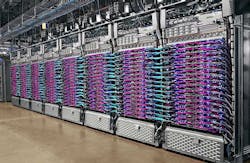Google Unveils $13 Billion in New Data Center Construction for 2019
Google will build new data centers in Texas, Ohio, Nevada and Nebraska as part of a major expansion of its Internet infrastructure in 2019, the company said today. Google CEO Sunday Pichai said the company will invest $13 billion in new data center campuses and offices, creating 10,000 new construction jobs.
The search leader will also add data center infrastructure in Virginia, Oklahoma and South Carolina, expanding on existing cloud computing nodes.
“Our new data center investments, in particular, will enhance our ability to provide the fastest and most reliable services for all our users and customers,” Pichai said in a blog post. “As part of our commitment to our 100 percent renewable energy purchasing, we’re also making significant renewable energy investments in the U.S. as we grow. Our data centers make a significant economic contribution to local communities, as do the associated $5 billion in energy investments that our energy purchasing supports.”
Google is a pioneer in data center infrastructure, and has set the pace for the industry with the scale and efficiency of its global network. In recent years, Google has dramatically stepped up its capital investment in data centers, while amassing land for more facilities to support the gargantuan data storage requirements that lie ahead.
Pichai didn’t offer details on the new locations. But our reporting at DCF, combined with local news media, provides some clues in each state;
- Ohio: Google hasn’t announced a site in Ohio, but in December a Google affiliate it purchased 440 acres of land in New Albany, a fast-growing data center hub near Columbus where Amazon Web Services and Facebook already operate data centers.
- Nevada: State officials have approved an application for Google to build a $600 million data center in the city of Henderson in Clark County, Southeast of Las Vegas. That may not wind up being the only Nevada site. In 2017 Google reportedly bought 1,210 acres of land at the Tahoe Reno Industrial Center to lock down land for a future data center campus.
- Texas: In August, Google bought property for a potential data center in Midlothian, Texas, which is about 25 miles southwest of Dallas. The project, along with the Facebook campus in Fort Worth, figures to help build the case for Dallas as an emerging market for hyperscale infrastructure as well as serivce provider and corporate data centers.
- Nebraska: Google is not confirmed to have made any land purchases in Nebraska, but there is speculation that it is the tenant behind “Project Wizard,” a 275-acre data center project in Sarpy County, not far from a Facebook campus. One of Google’s largest existing cloud campuses is in nearby Council Bluffs, Iowa.
- Virginia: Google has a major expansion underway in Northern Virginia, where it has two data center campuses under construction in Loudoun County, one in Arcola and another near Leesburg. The company has also reportedly taken a large lease with a private developer for capacity in a new data center project in Ashburn.
- Oklahoma: Google will invest another $600 million in its data center campus in Pryor, Oklahoma in Mayes County, which opened in 2011.
- South Carolina: The large existing cloud campus in Goose Creak, just north of Charleston, will see further expansion with the investment announced today.
A Google data center in Mayes County, Oklahoma. (Photo: Google)
Cloud computing is reshaping America’s Internet infrastructure, focusing IT capacity in energy-efficient hubs that leverage the latest advances in data center design and energy procurement. Google was an early pioneer in these data center hubs, which offer economies of scale, enabling companies to rapidly add server capacity and electric power as more workloads shift from in-house IT rooms into these massive server farms. It has become routine for hyperscale companies like Google to invest more than $1 billion in a single location where they place a cloud campus.
Google is on the bleeding edge of data center technology, customizing virtually all elements of its operations, from the chips right up to the building design. Google has recently shifted to liquid cooling with its latest hardware for artificial intelligence, as the heat generated by its new Tensor Processing Units (TPUs) has exceeded the limits of its previous data center cooling solutions.
About the Author



